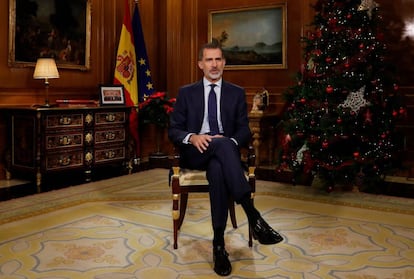Politicians from all sides of the spectrum respond to King Felipe’s Christmas speech
The anti-austerity Unidas Podemos praised the monarch for softening his tone on the issue of Catalonia, while Catalan and Basque parties criticized the address

Spanish politicians from all sides of the political spectrum have reacted to King Felipe VI’s Christmas message, which was broadcast on December 24 and was dedicated in large part to the challenges facing Spain.
“The lack of jobs – especially for our young people – and the financial difficulties of many families, particularly those most vulnerable, continue to be the main concern for our country,” the monarch said in his 12-minute address, which also mentioned climate change.
Felipe VI added that Spain was facing “other serious issues” including the “the loss of trust [...] in institutions and of course Catalonia,” where a push for independence has divided the northwestern region.
Last night, we saw the head of state, moderate his discourse and show better political sense
Unidas Podemos deputy Pablo Echenique
In a veiled reference to Catalonia, the monarch praised Spain for its “willingness to understand and integrate our differences in respect to our Constitution that recognizes our defining territorial diversity and that preserves the unity that gives us strength.”
The king’s call for peaceful coexistence in Spain, at a time of continuing tensions in the region of Catalonia, which saw violent protests following a Supreme Court ruling which sentenced separatist leaders to prison for their involvement in the 2017 breakaway attempt, received a mixed reaction by Spain’s politicians.
The anti-austerity Unidas Podemos on Wednesday praised the king for softening his tone on the issue of Catalonia. “Last night, we saw the head of state partially rectify [his tone], moderate his discourse and show better political sense,” said Unidas Podemos deputy Pablo Echenique. The king made a televised address in 2017 in the wake of the Catalan crisis, and was criticized by certain sectors for what was perceived as an excessively hardline approach to the issues relating to the secessionist drive.
Socialist Party (PSOE) Senator Cristina Narbona supported the king’s address for “identifying challenges and obstacles” such as gender inequality and climate change. In a message on Twitter, Narbona said that the Spanish people “are capable of facing [these challenges] together.”
The conservative Popular Party (PP), center-right Ciudadanos (Citizens) and far-right Vox also applauded the king’s address.
Catalonia is not the problem. A state that does not know how to give a political democratic response is
Catalan speaker Roger Torrent
PP leader Pablo Casado said that the king had “defended the force of the Constitution and unity of Spain,” Vox chief Santiago Abascal repeated the monarch’s call to “maintain our unity,” and Inés Arrimades from Ciudadanos described the address as “pertinent and refined.”
But the king’s address was not received so positively by Catalan and Basque parties.
Catalan pro-independence politicians criticized King Felipe for calling Catalonia a “serious issue.” “Catalonia is not the problem. A state that does not know how to give a political and democratic response is. It’s worrying that he sees Catalonia as a concern,” said Roger Torrent, the speaker of the Catalan regional parliament. Catalan premier Quim Torra agreed that the real concern was “Spain, a European state that violates human rights.”
Basque parties were also critical. Aitor Esteban, the congressional spokesperson of the Basque Nationalist Party (PNV), said the king gave an “easy speech” that “did not address the need to reform” the Spanish Constitution. He added that the monarch made no reference to Basque Country in his speech
Mertxe Aizpurua, the congressional spokesperson of the Basque radical left coalition EH Bildu, said Felipe VI “voluntarily forgot that there are millions of men and women who want to resolve political problems by expanding democracy.”
English version by Melissa Kitson.
Tu suscripción se está usando en otro dispositivo
¿Quieres añadir otro usuario a tu suscripción?
Si continúas leyendo en este dispositivo, no se podrá leer en el otro.
FlechaTu suscripción se está usando en otro dispositivo y solo puedes acceder a EL PAÍS desde un dispositivo a la vez.
Si quieres compartir tu cuenta, cambia tu suscripción a la modalidad Premium, así podrás añadir otro usuario. Cada uno accederá con su propia cuenta de email, lo que os permitirá personalizar vuestra experiencia en EL PAÍS.
¿Tienes una suscripción de empresa? Accede aquí para contratar más cuentas.
En el caso de no saber quién está usando tu cuenta, te recomendamos cambiar tu contraseña aquí.
Si decides continuar compartiendo tu cuenta, este mensaje se mostrará en tu dispositivo y en el de la otra persona que está usando tu cuenta de forma indefinida, afectando a tu experiencia de lectura. Puedes consultar aquí los términos y condiciones de la suscripción digital.








































